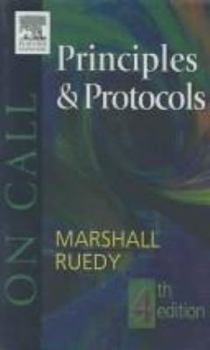On Call Principles and Protocols : On Call Series
Select Format
Select Condition 
Book Overview
Be on call with confidence Successfully managing on-call situations requires a masterful combination of speed, skill, and knowledge. The pocket-sized titles in the On Call series provide you with immediate access to the vital, step-by-step information you need to rise to the occasion When you're on call...alone...in the middle of the night...they're your answer books for what to do and how to do it quickly-from diagnosing a difficult or life-threatening situation to prescribing the right medication.Provides easy-to-reference, specialty-specific guidance on how to manage problems that arise while on call without direct supervision.
Catalogs the calls you are most likely to receive and provides you with the questions you should ask to assess the urgency of each situation.
Details the ideal approach to diagnose and manage patients, communicate with colleagues and families, and avoid common mistakes for every call.
Reviews the temporary orders appropriate for each call, as well as the general protocol, and the major threats to life you must consider before arriving at bedside.
Indexes problems by disease as well as by symptoms to expedite your access to the answers you need.
Includes a comprehensive collection of differential diagnoses and a detailed formulary of commonly used medications-a quick, alphabetically arranged reference for indications, drug dosages, routes of administration, side effects, contraindications, and modes of action.
Catalogs the calls you are most likely to receive and provides you with the questions you should ask to assess the urgency of each situation.
Details the ideal approach to diagnose and manage patients, communicate with colleagues and families, and avoid common mistakes for every call.
Reviews the temporary orders appropriate for each call, as well as the general protocol, and the major threats to life you must consider before arriving at bedside.
Indexes problems by disease as well as by symptoms to expedite your access to the answers you need.
Includes a comprehensive collection of differential diagnoses and a detailed formulary of commonly used medications-a quick, alphabetically arranged reference for indications, drug dosages, routes of administration, side effects, contraindications, and modes of action.
Format:Paperback
Language:English
ISBN:072163902X
ISBN13:9780721639024
Release Date:July 2004
Publisher:Saunders
Length:560 Pages
Weight:1.05 lbs.
Dimensions:0.7" x 4.8" x 7.3"
Customer Reviews
4 ratings
excellent reference
Published by Thriftbooks.com User , 15 years ago
I am a Physician Assistant working the night shift and this is an excellent reference!
excellent reference for medical students/junior residents
Published by Thriftbooks.com User , 19 years ago
This book and Pocket medicine are the only 2 references you need during your clinical rotations in medical school to look like a star. This book is very practical: you can literally take it your first night on call, look up the patient presentation in front of you and know exactly what to do. It will make your resident think you know more then them. I also found these 2 books very helpful for first year residency as well.
FP in practice--still using it on call!
Published by Thriftbooks.com User , 20 years ago
I used the first edition of this book as a med student and as a resident, and it got totally worn bc I used it so often. I've been out in practice for over 5 years now, and I still use it (newer edition) when I'm on call, and even in the clinic. It's great because it gives the info you need for assessing and managing common acute in-patient problems ("elevator thoughts"), and lists the most critical and the most common differential diagnoses. It's also very concise, so you can find info fast, and not have to go flipping through pages of useless info when someone on the ward is crashing. It's well worth the money.
A must read for new interns!
Published by Thriftbooks.com User , 24 years ago
This is an excellent book! It outlines some of the most crucial principles for surviving the first year of residency. Example, time management and assigning tasks.....





